Welcome to Day 17 in our month-long horror movie madness here at Speculative Chic! Today on The Kasturi/Files, we talk about Jordan Peele’s deeply strange movie, Us. Plus a weird cocktail. This time we had a tough time finding book recommendations that really fit, because Peele’s movie is so uniquely his own very odd thing, that we couldn’t think of anything that was really like it. So the recs are just sort of in the ballpark. If any of you have suggestions for other books, please leave them in the comments!
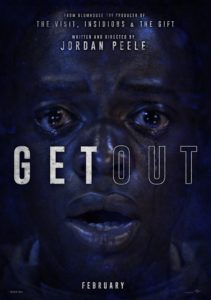 Gemma: In 2017, Jordan Peele — formerly probably best known as an actor/writer on Key & Peele, the sketch comedy show he co-created with Keegan-Michael Key — sprang full-blown onto the horror scene with Get Out, his directorial debut, which not only grossed $255 million worldwide on a $4.5 million budget but also garnered a Best Picture Academy Award nomination, eventually winning Peele a Best Original Screenplay Oscar. All of which it totally deserves, not least for managing to shoehorn a savage satire of white “wokeness” into the middle of an existential nightmare that plays like half Rod Serling, half Franz Kafka. Thought-provoking, scary and bleakly hilarious, the film — much like Marvel’s Afrofuturist Black Panther — became a truly necessary cultural happening, lodged bone-deep in the throat of an already racially polarized America; Tananarive Due and Steven Barnes now teach an online course based on the film for credit at UCLA entitled “The Sunken Place: Racism, Survival and Black Horror,” which you sure can’t say about most summer blockbusters. But what would he do for an encore, aside from reboot both The Twilight Zone and Candyman?
Gemma: In 2017, Jordan Peele — formerly probably best known as an actor/writer on Key & Peele, the sketch comedy show he co-created with Keegan-Michael Key — sprang full-blown onto the horror scene with Get Out, his directorial debut, which not only grossed $255 million worldwide on a $4.5 million budget but also garnered a Best Picture Academy Award nomination, eventually winning Peele a Best Original Screenplay Oscar. All of which it totally deserves, not least for managing to shoehorn a savage satire of white “wokeness” into the middle of an existential nightmare that plays like half Rod Serling, half Franz Kafka. Thought-provoking, scary and bleakly hilarious, the film — much like Marvel’s Afrofuturist Black Panther — became a truly necessary cultural happening, lodged bone-deep in the throat of an already racially polarized America; Tananarive Due and Steven Barnes now teach an online course based on the film for credit at UCLA entitled “The Sunken Place: Racism, Survival and Black Horror,” which you sure can’t say about most summer blockbusters. But what would he do for an encore, aside from reboot both The Twilight Zone and Candyman?
The answer? Us.
Sandra: I loved Jordan Peele’s first movie, Get Out, and its nasty satirical look at suburbia and race relations. And just weird fucked-up-white-people shit. I did not like Us as much, or rather, I didn’t like it in quite the same way — I found it disturbed me deeply, this idea of other versions of us just lurking somewhere waiting to take over. The idea of being pursued by something that is you-but-not-you, or the monster version of you, your evil twin (hello, Stephen King’s The Dark Half), is not a new one, but Peele does his own unique thing with it.
“The idea for this movie came from a deep-seated fear of doppelgängers,” Peele said in an interview. “I love doppelgänger mythologies and the movies that have dealt with them, and I wanted to make my offering to that pantheon of ‘evil-double’ films.”
“I was drawn to this idea that we are our own worst enemy. That’s something we all know intrinsically, but it’s a truth we tend to bury,” he adds. “We blame the outsider, we blame ‘the other.’ In this movie, the monster has our faces.”
Variety magazine also described Us as “a visual allegory for the darker aspects of our own socialization — which, if the film were more successful in its final stretch, would force us to confront the monsters within each of us.”
I disagree that the film isn’t successful — I think it absolutely is. I just think people wanted another Get Out, and they got something, well, wholly other.
Gemma: With a budget roughly four times that of its predecessor, Us was also a commercial success, reaping a $255.1 worldwide gross even though response to it was both less political and a bit more fractured, critically — many reviewers admitted to finding it visually exciting yet thematically oblique, a risky, metaphorically loaded exploration not so much of what it means to be black in America as of what it means to be American, period.
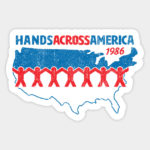 The movie begins with a flashback to 1986, the year of Michael Jackson’s seminal Thriller album and “Hands Across America,” a well-meaning campaign aimed at raising money to fight hunger, homelessness, and poverty through a one-day community action during which approximately 6.5 million people held hands for fifteen minutes in an attempt to form a human chain across the contiguous United States. On the pier in Santa Cruz, Adelaide (played by Madeline Curry as a child, Lupita Nyong’o as an adult) wanders away from her squabbling parents, ending up in a strange funhouse full of mirrors where she meets an upsetting dopplegänger of herself. When she emerges, she appears to be suffering from hysterical mutism, which slowly ebbs away as she matures.
The movie begins with a flashback to 1986, the year of Michael Jackson’s seminal Thriller album and “Hands Across America,” a well-meaning campaign aimed at raising money to fight hunger, homelessness, and poverty through a one-day community action during which approximately 6.5 million people held hands for fifteen minutes in an attempt to form a human chain across the contiguous United States. On the pier in Santa Cruz, Adelaide (played by Madeline Curry as a child, Lupita Nyong’o as an adult) wanders away from her squabbling parents, ending up in a strange funhouse full of mirrors where she meets an upsetting dopplegänger of herself. When she emerges, she appears to be suffering from hysterical mutism, which slowly ebbs away as she matures.
Sandra: Even that “Hands Across America” logo seems sinister in hindsight, all those blank paper-doll cutouts holding hands . . . they could be ANYBODY.
Gemma: In the present day, meanwhile, Adelaide is a shy but beautiful woman with a picture-perfect life and no trouble speaking — happily married to successful, self-satisfied Gabe Wilson (Winston Duke), with whom she has two children, athletic daughter Zora (Shahadi Wright Joseph) and slightly eccentric, mask-wearing son Jason (Evan Alex). As they travel back up to their vacation home near Santa Cruz, Gabe twits Adelaide slightly for being so wary of the beach; he’s far too excited to show off his new boat to their rich white friends Kitty (Elizabeth Moss) and Josh (Tim Heidecker) to take her qualms seriously, especially when she can’t really tell him what she’s afraid of.
This time, however, it’s Jason who wanders away, unconsciously tracing young Adelaide’s path towards a new exhibit which stands where the funhouse used to. As he pauses to watch a man in a red jumpsuit who’s standing with his face turned towards the setting sun (arms outstretched, hands dripping blood), Adelaide realizes he’s gone and starts to panic. She finds Jason quickly, but insists on going home, where…later that night…four new figures in red jumpsuits are discovered waiting at the bottom of the Wilsons’ driveway, hand in hand in hand in hand. “There’s a family outside,” Jason remarks — then later amends, once they come closer: “. . . it’s us.”
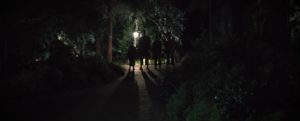
Which it is, of course: the same four actors playing their own inverse doubles, badly copied creatures from someplace far underground who call themselves the Tethered, invading the Wilsons’ home with clear intent to seize and repurpose it for themselves. They’re led by Red, an eyebrow-less, scissors-wielding version of Adelaide herself, whose harsh, choked voice echoes the trauma Adelaide can barely remember. “Once upon a time, there was a girl,” Red tells her, “and the girl had a shadow. The two were connected…when the girl ate, her food was given to her warm and tasty. But when the shadow was hungry, she had to eat rabbit, raw and bloody. On Christmas, the girl received wonderful toys; soft and cushy. But the shadow’s toys were so sharp and cold, they sliced through her fingers when she tried to play with them…” She introduces her version of Gabe — hulking Abraham — and her own two “little monsters,” the psychotic Umbrae (Zora) and the fire-obsessed Pluto (Jason), who immediately attack their own reflections while Red forces Adelaide to handcuff herself to the coffee-table, grinning at her discomfort. “Who are you people?” Gabe demands, face already bloodied from fighting off “himself,” to which Red just replies: “We’re Americans.”
Sandra: That moment where Jason says “it’s us” chilled me to the bone. It hits me in all my nightmare-fueled late-night anxieties. It’s funny that we’re so creeped out by this idea, because of course twins exist in the real world, and they grow up with each other, and it’s perfectly normal. So what’s the problem? Is it just the not knowing that there’s a double of you that’s so troubling? The idea of some underground world where all kinds of things are going on that you have no control over, full of people that are actively hostile to you — put there by the Those In Charge (whom you’re supposed to trust — ha!), is maybe literally crazy-making.
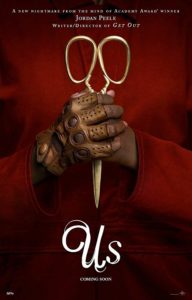 Gemma: The completely lunatic idea that the government of the United States of America created a haphazard mirror version of the entire country whose inhabitants only exist to mimic the actions of their above-ground counterparts, only to later abandon it for equally inscrutable reasons (Red implies it might have been budget cuts, but how would she know?) and cover up all hints of its existence is a serious Twilight Zone episode pitch from hell, at least as Cheez Whiz-metaphorical as something like “I Am the Night — Color Me Black,” in which “all the hatred in the world” gets literally translated into a huge black cloud that descends on a racist little town forever. Actually, it reminds me a lot of the wonderful “explanation” from Vincenzo Natali’s CanCon sci-fi survival horror film Cube as to why a giant box full of Rube Goldberg deathtraps even exists in the first place, let alone why said box keeps on getting continually restocked with random victims: “It’s a government make-work project. Somebody approved it, and it just keeps on going.” At least in this case, all the Tethered are equally envious of and willing to slaughter their reflections, whether they’re black, white or any other shade in between…they just want what we have, or what they think we have: freedom, pleasure, joy. The ability to simply be themselves, whatever the fuck that eventually turns out to be, once they don’t have to do what we do anymore.
Gemma: The completely lunatic idea that the government of the United States of America created a haphazard mirror version of the entire country whose inhabitants only exist to mimic the actions of their above-ground counterparts, only to later abandon it for equally inscrutable reasons (Red implies it might have been budget cuts, but how would she know?) and cover up all hints of its existence is a serious Twilight Zone episode pitch from hell, at least as Cheez Whiz-metaphorical as something like “I Am the Night — Color Me Black,” in which “all the hatred in the world” gets literally translated into a huge black cloud that descends on a racist little town forever. Actually, it reminds me a lot of the wonderful “explanation” from Vincenzo Natali’s CanCon sci-fi survival horror film Cube as to why a giant box full of Rube Goldberg deathtraps even exists in the first place, let alone why said box keeps on getting continually restocked with random victims: “It’s a government make-work project. Somebody approved it, and it just keeps on going.” At least in this case, all the Tethered are equally envious of and willing to slaughter their reflections, whether they’re black, white or any other shade in between…they just want what we have, or what they think we have: freedom, pleasure, joy. The ability to simply be themselves, whatever the fuck that eventually turns out to be, once they don’t have to do what we do anymore.
Sandra: Maybe it’s just another version of Hell, or Hell on Earth? Secret inimical, evil agencies at work underneath our very feet — except instead of looking like demons, they look exactly like us. And they’re better at most things than we are, too — or better at survival, at any rate. It also plays into the basic human (and diametrically opposed) desires to be (a) unique, and (b) exactly like everyone else. Being slapped in the face with your own lack of uniqueness is just another version of finally cluing in to your own mortality — it messes you up, and leaves you on the edge of that existential abyss, right inside Freud’s “Unheimliche” — his uncanny-situated uncomfortable couch — which is where all great horror lives. And if we’ve learned nothing else from Star Trek, it’s that the mirror universe versions of ourselves will mess up your life, or maybe the whole universe. So you need to take those goateed motherfuckers out, given a chance. Which of course Adelaide and her family manage to do. But they don’t really win, do they, in the end? None of them (of us) do.
Gemma: I don’t want to go much further with a blow-by-blow, but the rest of Us suits me down to a tee: it’s bloody, and odd, and bloody, bloody odd. The performances are uniformly brilliant, especially Nyong’o’s. And then there’s that TWIST, worthy of M. Night himself. It, too, makes sense more on a poetic or philosophic level than a practical one. But then again, I’ve always loved opera.
Sandra: I agree. I’m not sure Us hangs together, logically speaking, but who cares? Screw the practical. As always, we’re sisters in our opera-loving, uncanny-living, dark, peculiar souls!
Cocktail: Doppelgänger
Sandra: Totally on theme, here is the Doppelgänger Cocktail! As a side note, I have a silly history with Chartreuse. I first heard of it when I read Lost Souls, written by Billy Martin, formerly Poppy Z. Brite, in which the characters drank it and it sounded so cool. I bought a bottle, and boy, that green color — so, so pretty! Then I drank some. It’s fucking disgusting. It was pricey, and I didn’t want to waste it, so I looked up recipes and found the “Green Hornet” which was scotch and Chartreuse. All that did was ruin perfectly good single-malt scotch. Sacrilege! My bottle of Chartreuse became a lovely green decoration on the shelf for years, until someone finally chugged it down at a party. Probably on a dare. Better them than me!
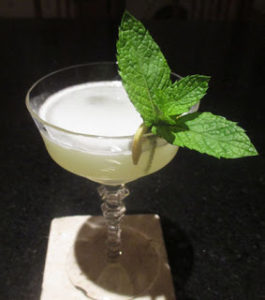 So I am somewhat hesitant to recommend a drink containing Chartreuse, but there are multiple offsetting ingredients, so I think you’ll be okay? But yeah: your mileage may absolutely vary a great deal on this one. (There are other obscure ingredients, but you may be able to sub in more common things — see below.)
So I am somewhat hesitant to recommend a drink containing Chartreuse, but there are multiple offsetting ingredients, so I think you’ll be okay? But yeah: your mileage may absolutely vary a great deal on this one. (There are other obscure ingredients, but you may be able to sub in more common things — see below.)
- 3/4 oz Genever (Bols)
- 3/4 oz Rhum Agricole (Clement Premiere Canne)
- 1/2 oz Pineapple Juice
- 1/2 oz Lime Juice
- 1/4 oz Green Chartreuse
- 1/2 oz Simple Syrup
Shake with ice, strain into a cocktail glass, and garnish with a mint sprig.
Bols Genever is something with a malty flavor, apricot tones and a “musky juniper hit.” So, if you can’t find it, perhaps apricot brandy or schnapps, a dash of something malty (scotch? hoppy beer?), and perhaps some juniper berries (you can get dried ones on Amazon). Rhum Agricole is sugar cane rum. Just use regular dark rum if you can’t find the other.
I think you may be in for some experimenting. Godspeed!
Book Recommendations
Sandra: I’d recommend Daphne du Maurier’s “Don’t Look Now.” It’s a strange, creepy story that provides the same level of disorientation as Peele’s movie, though otherwise isn’t really thematically related. Honestly, Us is so odd that I’ve had a difficult time finding anything that is remotely like it!
There’s Dan Vyleta’s The Quiet Twin, set in Nazi-era Vienna, and is kind of like Sigmund Freud staged a version of Cabaret, with the help of Fellini. Again, not horror (except real-life horrors), so might not be quite what you’re looking for, but it’s a very good book, and is thematically similar. I reviewed it here a few years ago if you want more details!
Okay, I’m going to recommend Tana French’s The Likeness even though it’s not really a horror novel. It’s French’s second “Dublin Murder Squad” book, and I suppose it’s technically a crime novel, but as with all of French’s books, the narrative trope of the mystery is just something she uses as a framework for whatever else she’s doing. I love French’s work so much (especially her first book, In the Woods), but this is a close second. Basically, Cassie Maddox, a homicide cop, is asked to step in undercover as her dead double — they look so alike that at first everyone thinks it’s Cassie who’s been killed. As she lives her doppelganger’s life, she starts to lose a sense of her own identity. It’s beautifully written, a good mystery, and again — just disorienting.
An older title, The Book of Doppelgängers, edited by Robert Sterling. I confess I don’t know this book, but it sounded intriguing! Classic stories by LeFanu, Hoffman, de Balzac, other dead white people.
Twice Told: A Collection of Doubles, edited by C.M. Muller, with stories by Patricia Lillie, Steve Rasnic Tem, Tim Major, and more. All about the doppelgängers, yo.
Coraline by Neil Gaiman. This one is quite famous and it’s a children’s book, but I include it because very little has creeped me out more than the double “other mother” with buttons for eyes. Eeeeeeeee!
And last, but never least, Victor Lavalle’s The Changeling, called a “dark fairy tale of New York” and winner of an American Book Award, a Locus Award for Best Horror Novel, a British Fantasy Award for Best Horror Novel, a World Fantasy Award for Best Novel, and nominated for a Shirley Jackson Award, an International Dublin Literary Award, and a Mythopoeic Award for Literature! All the awards!!
Gemma: I’m going to go right on back to Edgar Allan Poe, who definitely knew a thing or two about getting mistaken for somebody else/mistaking other people for people they weren’t, what with him having to cart around his despised adoptive father’s last name around as his middle one while fighting all the parts of his own nature that might cause people to confuse him with his drunken reprobate of a father, or his propensity to fixate on ladies who reminded him of his dead-from-consumption at a pitiably early age actress mother. The two stories which spring fastest to mind are, of course, “William Wilson,” in which a man’s attempt to disentangle himself from his own evil doppelgänger leads to murder by suicide, and “Ligeia,” in which a guy marries a woman because she’s nothing like his dark, brooding, death-obsessed dead first wife at all, only to inevitably find she’s turning into her. “Man doth not yield himself to the angels, nor unto death utterly, save only through the weakness of his feeble will!” Red would definitely agree, given she kicks off a giant replacement slaughter basically in order to get revenge on Adelaide for getting everything they should have shared, if only life was fair.
 Sandra Kasturi is the publisher of ChiZine Publications, winner of the World Fantasy, British Fantasy, and HWA Specialty Press Awards. She is the co-founder of the Toronto SpecFic Colloquium and the Executive Director of the Chiaroscuro Reading Series, and a frequent guest speaker, workshop leader, and panelist at genre conventions. Sandra is also an award-winning poet and writer, with work appearing in various venues, including Amazing Stories, Black Feathers: Dark Avian Tales, Prairie Fire, several Tesseracts anthologies, Evolve, Chilling Tales, ARC Magazine, Taddle Creek, Abyss & Apex, Stamps, Vamps & Tramps, and 80! Memories & Reflections on Ursula K. Le Guin. She recently won the Sunburst Award for her short story, “The Beautiful Gears of Dying,” in the anthology The Sum of Us. Her two poetry collections are: The Animal Bridegroom (with an introduction by Neil Gaiman) and Come Late to the Love of Birds. Sandra is currently working on another poetry collection, Snake Handling for Beginners, a story collection, Mrs. Kong & Other Monsters, and a novel, Wrongness: A False Memoir. She is fond of red lipstick, gin & tonics, and Idris Elba.
Sandra Kasturi is the publisher of ChiZine Publications, winner of the World Fantasy, British Fantasy, and HWA Specialty Press Awards. She is the co-founder of the Toronto SpecFic Colloquium and the Executive Director of the Chiaroscuro Reading Series, and a frequent guest speaker, workshop leader, and panelist at genre conventions. Sandra is also an award-winning poet and writer, with work appearing in various venues, including Amazing Stories, Black Feathers: Dark Avian Tales, Prairie Fire, several Tesseracts anthologies, Evolve, Chilling Tales, ARC Magazine, Taddle Creek, Abyss & Apex, Stamps, Vamps & Tramps, and 80! Memories & Reflections on Ursula K. Le Guin. She recently won the Sunburst Award for her short story, “The Beautiful Gears of Dying,” in the anthology The Sum of Us. Her two poetry collections are: The Animal Bridegroom (with an introduction by Neil Gaiman) and Come Late to the Love of Birds. Sandra is currently working on another poetry collection, Snake Handling for Beginners, a story collection, Mrs. Kong & Other Monsters, and a novel, Wrongness: A False Memoir. She is fond of red lipstick, gin & tonics, and Idris Elba.
 Formerly a film critic, journalist, screenwriter and teacher, Gemma Files has been an award-winning horror author since 1999. She has published two collections of short work, two chap-books of speculative poetry, a Weird Western trilogy, a story-cycle and a stand-alone novel (Experimental Film, which won the 2016 Shirley Jackson Award for Best Novel and the 2016 Sunburst award for Best Adult Novel). Most are available from ChiZine Publications. She has two new story collections from Trepidatio (Spectral Evidence and Drawn Up From Deep Places), one upcoming from Cemetery Dance (Dark Is Better), and a new poetry collection from Aqueduct Press (Invocabulary).
Formerly a film critic, journalist, screenwriter and teacher, Gemma Files has been an award-winning horror author since 1999. She has published two collections of short work, two chap-books of speculative poetry, a Weird Western trilogy, a story-cycle and a stand-alone novel (Experimental Film, which won the 2016 Shirley Jackson Award for Best Novel and the 2016 Sunburst award for Best Adult Novel). Most are available from ChiZine Publications. She has two new story collections from Trepidatio (Spectral Evidence and Drawn Up From Deep Places), one upcoming from Cemetery Dance (Dark Is Better), and a new poetry collection from Aqueduct Press (Invocabulary).

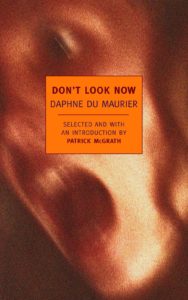


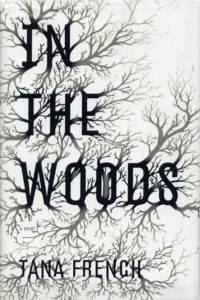
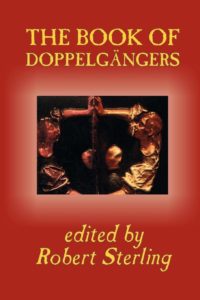

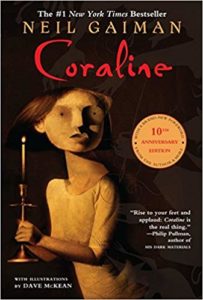
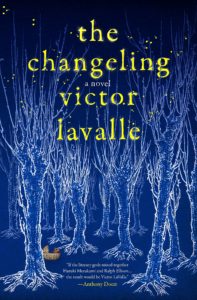
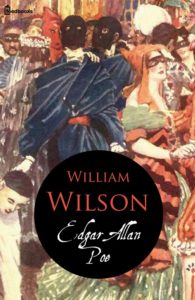
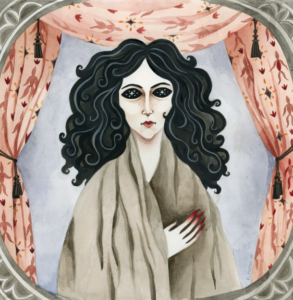
So I really want to rewatch this one some time. We did a Sound Off! for this movie, and these were my thoughts:
I was late to the party when it came to watching Get Out, so I was pleasantly surprised to have the opportunity to see Us on opening night. And I have to say, I’m still thinking about this movie.
When we got out of the theater, the group I was with was like, “That was…. interesting….” in a very uncertain tone, while also complimenting Us‘ originality. I didn’t want to launch into explanations, as that would’ve immediately put me into spoiler territory and that would’ve been cruel to the crowded movie hallway around us. Instead I said, “It’s the kind of movie that’s going to reveal something different every time you see it.” And I still believe that. It keeps revealing different things to me each time I think about it, and it’s quickly becoming a movie I want to watch again and again. For now, I’m content to read about it, but it seems like everyone is avoiding spoilers (and to be fair, even if you LIKE spoilers, I think avoiding them for this movie is wise), which means the topics of discussion I want to read about are not being published, at least not yet.
But I really want to read an analysis of this movie that’s not assuming that Us is all about the struggle with our darker, more violent mirror selves. Because there’s so much more going on here, and the “mirror self” analysis is too conventional (dare I say too white?) and off-point besides. It’s a movie about haves and have-nots (and if you read the movie title as “U.S.” instead of Us, that reading is REALLY appropriate). It’s a movie that talks about slavery in a way that is screamingly obvious to me, but to say more about why would devolve into spoilers.
So, what can I say? Lupita Nyong’o is absolutely amazing in this film, and she reminds you that she’s an Oscar-winner for a reason. Really, all of the acting is well-done (especially the kids), and the script is such that it feels like real people talking and interacting with each other (Winston Duke’s Gabe Wilson was so refreshingly funny and real in the way he interacted with his wife, especially when it was time to go to bed). The tension is this movie, especially at the very start, is absolutely gripping. I was on edge for the entire beginning, and the opening credits? It shouldn’t have been as terrifying as it was, but it was, and I credit not only the choral section in the score for that (which. was. AMAZING.), but also the cinematography during the sequence. The cinematography for the entire movie was just great, and it constantly fueled the tension of the film.
I had a few quibbles upon first watch that’ll likely get resolved when I get to see it again: I never believed young Adelaide was with her mother at the beginning. The woman with Adelaide and her father acted more like an annoyed girlfriend than a mother, and it’s not to say all mothers have to act to type, but it was such a stark comparison of annoyed indifference to the next time we see her weeping about her daughter (not a spoiler) that I thought the latter emotions were fake. Also, what’s up with all of the rabbits? And I’m still parsing out the very end.
Us is a movie that invites re-watching, and it’s memorable. The themes aren’t necessarily easy to digest for everyone, but I think that makes it important. Horror can come from a variety of places, and seeing what horror looks like from perspectives other than my own makes me think, and if this movie has done anything, it’s made me think. A lot. And with that in mind, I can’t wait to see Us again. I now want to see Get Out again. And I’m really looking forward to seeing what Jordan Peele does next.
***
You can read everyone else’s thoughts here if you’re interested.
Oh, I completely forgot! I’m so thrilled by your Tana French recommendation. I’ve only read In the Woods and The Likeness, and I love them both, though I think I’m partial to The Likeness. Both books have this wonderfully creepy/supernatural feel to the mysteries, and it’s amazing. Also, I discovered these two books are being adapted into a tv show on STARZ!
I loved In the Woods. Even though Tana French’s books aren’t technically horror, I do think there is something deeply horrific about them. I still think about Rob as a child, alone in the woods, in sneakers filled with blood. I keep hoping that her next book will be as good as In the Woods, but it’s by far my favorite. The Secret Place is my second favorite because the all girls’ boarding school reminded me of my experience at a women’s college. There is something about the insular, isolated nature of such a place that just lends itself to creepiness. I thought The Likeness was implausible but was about to go with it because I like French’s writing so much.
I was incredibly disappointed by French’s most recent book, The Witch Elm. The main character is a spoiled jerk and takes 200 pages to get to the central mystery. The end was a mess. I am shocked that I didn’t like a Tana French book because at least enjoyed all the other ones.
I think Joe Hill’s story “My Father’s Mask” would be a good read-alike for Us. It’s in his 20th Century Ghosts collection. I love that you recommended Tana French too! (c: